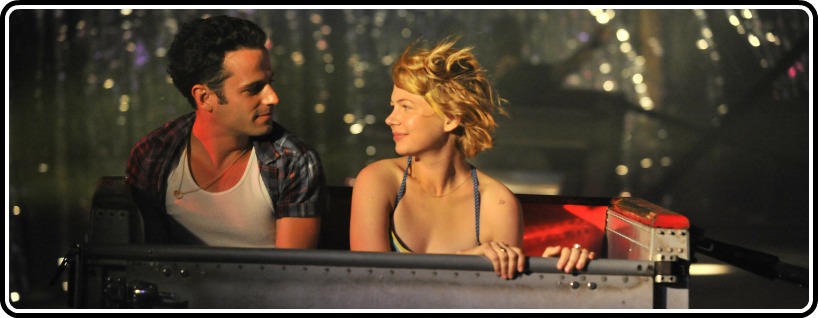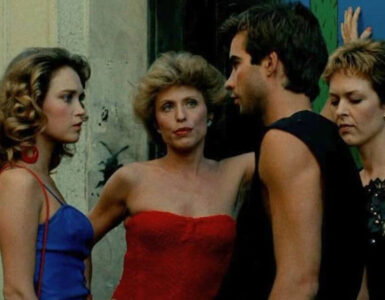
‘Take This Waltz’, a song by Leonard Cohen, with loosely interpreted lyrics from a Federico Garcia Lorca poem, is crammed with images of beauty, sadness, longing and passion. Sarah Polley’s second feature, executed with an acute assuredness, is named after the song, a film that combines all of these elements into a candidly adult look at the matter-of-fact cyclical nature of relationships.
Margot (Michelle Williams) has been married to Lou (Seth Rogen) for five years. They live in their house in Toronto (some of the best modern-day art direction in years). She writes things like tourist information for attractions, and he is working on a cookbook of chicken recipes. Overall they are still quite happy and love one another, even if he is preoccupied with his book, she is in a constant state of unacknowledged restlessness and sex is a rare occurrence. Oh and did I mention the foxy artist/rickshaw driver who lives across the street?
All of this sounds like a recipe for yet another indie film that takes the middling approach to relationships with some quirk thrown in, misguidedly putting on airs as something authentic. Luckily, Take This Waltz is authentic and goes far in representing a mature, mercilessly honest look at a situation with no easy answers. As Margot allows herself to spend time with Daniel (Luke Kirby), she immediately understands that his presence will complicate things. They are instantly drawn to each other, and the more they spend time together, the harder it becomes for her to repress her desires. She is racked with guilt, while he puts no stock in the institution of marriage. He remains patient, never pushing too far and always waiting for her to be the one to take the next step.
Refreshingly, there are no helpful shortcuts provided by writer/director Polley. Lou is a genuinely good-natured guy without it being overkill. When Margot tells him she loves him, she isn’t lying. Daniel does not turn out to have nefarious baggage or commitment issues. There is no circumstance in plot that allows one of these men to be taken out of the picture, nor does it shy away from forcing Margot to solve her dilemma.
Take This Waltz is about what often happens with two people have been together for a long time. With familiarity comes comfort. But once the novelty of comfort wears off, all you are left with is familiarity, and with that comes longing, melancholy and unfulfillment. Daniel forces Margot’s latent feelings to surface in a big way. The idea of cyclical love runs throughout; the newness of Daniel gleams before her.
Especially when her dynamic with him is much different than it is with Lou. Margot and Lou have a playful interplay. In this way, Polley captures the idiosyncratic nature of long-term relationships and the individuality of a world you create with someone else that is entirely your own. Most of the playful material between the two will likely be irksome to viewers; but isn’t that the point? That is why the world created by two people remains largely private; because it’s often silly, obnoxious, childish and most importantly, endlessly repetitive. Polley gets the awkwardness of being an outsider looking in on this stuff, and she plunges us into their daily lives. In this way, the film reminded me of the central couple in the 2010 German film Everyone Else, albeit in a much healthier form.
Margot and Daniel, on the other hand, have an erotic charge whenever they are together. Some of Polley’s best work are the scenes between the two that are dripping with lust despite them simply talking, going on a ride, swimming, walking, etc. Although, there is some graphic sexual dialogue between the two that happens to be almost illegally sensual. Considering that sex is the major thing missing in her marriage, Daniel dangles infinite sexual possibilities in front of her that are increasingly impossible to resist. Williams is drenched in sunlight during her scenes with him; she is once again vibrant, attracted by the shine of the new.
Michelle Williams does not really need to continue proving that she is arguably the actress of her generation, but she nevertheless does with her reliably astonishing work here. Margot is a complicated and flawed figure, and Williams fleshes her out to the point where no doppelganger of her character exists in any other film; a rare feat. She is guilt-ridden, awkward, childish, loving and empty. We feel an all-too human empathy for her situation because its unfortunate common occurrence in the real world is all too recognizable. It is all the harder to take because films tend to skirt the complexities of this everyday issue, sugarcoating reality and constructing circumstances that make the choice an easy call for characters.
There are a few missteps here and there. Kirby’s character is painted in strokes a bit too broad. We get a sense of him and his unconventional views, but he never feels characterized enough, despite the fact that this is Margot’s story. One speech early on about ‘being afraid of being afraid’ is a stereotypical indie-movie-monologue nightmare. Sarah Silverman’s character placement, Lou’s recovering alcoholic sister, feels too ‘written’. We can see from the start what her eventual purpose will be and Polley’s hand setting the cards in place is distractingly deliberate. And lastly, can we kill the trope that says a couple watching TV automatically means a relationship is in a rut? Seriously.
‘There is always going to be a gap’, Sarah Silverman’s character says, and this is pretty much the message of Take This Waltz. It does not shy away from its scenario which goes relatively unexplored in film, at least in ways that feel relevant. This feels relevant. It’s also nice to feel respected by Polley as a receptive audience member. There are so many moving instances, scenes and performance moments to be had and its final act is quite the bold move. It is apparent pretty much at the outset that some are going to be very annoyed by this film, but frankly, it comes with the package. By the end I was extremely thankful that Sarah Polley had successfully executed a serious and awkward romantic drama that comes from the female perspective.
Take This Waltz is currently available in a Pre-Theatrical run OnDemand.
http://www.youtube.com/watch?v=xUQTNY5yaVk





![Bergman Island (The Criterion Collection) [Blu-ray]](https://criterioncast.com/wp-content/uploads/2022/11/bergman-island-the-criterion-collection-blu-ray-400x496.jpg)
![This Is Not a Burial, It’s a Resurrection (The Criterion Collection) [Blu-ray]](https://criterioncast.com/wp-content/uploads/2022/11/this-is-not-a-burial-its-a-resurrection-the-criterion-collection-blu-ray-400x496.jpg)
![Lars von Trier's Europe Trilogy (The Criterion Collection) [The Element of Crime/Epidemic/Europa] [Blu-ray]](https://criterioncast.com/wp-content/uploads/2022/11/lars-von-triers-europe-trilogy-the-criterion-collection-the-element-of-400x496.jpg)
![Imitation of Life (The Criterion Collection) [Blu-ray]](https://criterioncast.com/wp-content/uploads/2022/11/imitation-of-life-the-criterion-collection-blu-ray-400x496.jpg)
![The Adventures of Baron Munchausen (The Criterion Collection) [4K UHD]](https://criterioncast.com/wp-content/uploads/2022/11/the-adventures-of-baron-munchausen-the-criterion-collection-4k-uhd-400x496.jpg)
![Cooley High [Criterion Collection] [Blu-ray] [1975]](https://criterioncast.com/wp-content/uploads/2022/11/cooley-high-criterion-collection-blu-ray-1975-400x496.jpg)